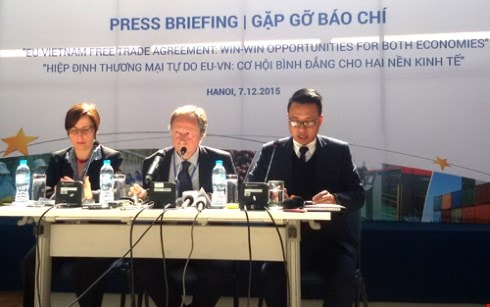Vietnam - EU FTA officially takes effect in 2018
The agreement opens up huge market potential, facilitating Vietnamese exports to penetrate deeper into the EU market.
The Vietnam – EU Free Trade Agreement (FTA) will officially take effect in 2018, opening up a huge potential market and a wave of high-quality investment from both sides. That was the information given at a press conference on “Vietnam – EU Free Trade Agreement: Equal opportunities for the two economies” organized by the Delegation of the European Union to Vietnam on December 7 in Hanoi.
At the press conference, answering questions about the opportunities and challenges of the Vietnam - EU Free Trade Agreement, Ambassador - Head of the European Union Delegation to Vietnam Bruno Angelet said: In terms of trade benefits, the agreement opens up huge market potential, with 99% of tax lines being cut to 0%, which is favorable for Vietnamese exports to penetrate deeper into the EU market.
As for the investment sector, EU investors are currently very interested in what the Government and Vietnam will do to prepare to attract investment in the coming time. The wave of EU investment in Vietnam is showing many positive signs, but investors are very interested in the investment environment, social responsibility, working conditions for workers, etc.
 |
| Press meeting on “Vietnam – EU Free Trade Agreement: Equal opportunities for the two economies” |
Ambassador - Head of the Delegation Bruno Angelet added that the Vietnam - EU Free Trade Agreement will have to go through a process of approval before it officially takes effect, expected in 2018. Therefore, 2 years is an appropriate time for both sides to prepare and reform the law, effectively implement the agreement and the EU will also commit to providing technical support to Vietnam.
“Regarding the rule of law, the EU will provide 14 million Euros to help people have better access to laws and policies. In addition, the EU supports trade and investment (MUTRAP program) to help improve Vietnam's capacity in international trade activities, export its products and support ASEAN member countries, including Vietnam, to implement the ASEAN Community well. In the financial sector, it will support Vietnam to improve its public financial capacity and ensure fiscal balance. Because Vietnam is currently participating in many FTAs, there must be many measures to balance the fiscal balance when Vietnam has to cut taxes according to the agreements,” Mr. Bruno Angelet pointed out.
The EU is Vietnam’s second largest trading partner and export partner. The EU accounts for 20% of Vietnam’s exports, of which electronic products and telephones account for a large proportion of 30%. In addition, the EU is also a major investor in Vietnam, rising from 6th place in 2014 to 3rd place now./.
According to VOV.VN
